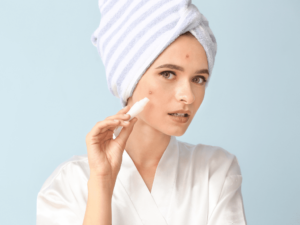Preservatives and antioxidants are present in all cosmetics like creams, lip balms, lotions, skin oils, etc. Preservatives and antioxidants are necessary because they extend the life of your skincare products. The two are different and have their own particularities. Before buying or ordering online, you should know more about the creams and serums’ compounds and the preservatives and antioxidants used. To better understand their role in cosmetics and not only, we recommend you to continue reading and learn more about these active ingredients.
What are preservatives?
Preservatives are ingredients you can find in your cosmetics., used to extend your product’s life. They aim to keep your creams and lotions safe and delay the alteration. They inhibit the development of microorganisms that cause this alteration while the producer formulates, stores or ships the products.
Because cosmetics are water-based, they tend to develop these microorganisms. Numerous regulations in place impose a concentration limit of preservatives for the formula of the product. Also, when creating a product, the manufacturer must use specific ingredients that are considered safe for everyday use.
Preservatives used can be synthetic or natural. When you see a product containing artificial preservatives, you must know that the manufacturer uses them in low concentrations. They are added to inhibit a large spectrum of bacteria and fungi.
The categories for synthetic preservatives consist of aldehydes, glycol ethers, parabens and organohalogen compounds.
When buying a product that is labelled as natural or organic, you must check the ingredient list. Search for natural preservatives such as sorbic, benzoic, salicylic acids or alcohol. Before opening and using the product, you must read the instructions about properly storing the cream or serum.

What are antioxidants?
Antioxidants are compounds that help your skin against UV rays and pollution. They aim to protect you from oxidative damage, caused by environmental factors. Moreover, they are great ingredients that most skincare products contain because they have an anti-wrinkle and anti-ageing effect. Antioxidants make your skin look rejuvenated and tightened because these active ingredients prevent skin cell damage caused by oxidation reactions. If there are no antioxidants in your product, free radicals will have unwanted effects like skin pigmentation, photoaging, and wrinkles. This way, a topical antioxidant will inhibit reactions defending the skin from environmental impacts and stress.
The product ingredients are plants like rosemary and blueberry or grape seeds, known for their great impact on your skin.
Is antioxidant a preservative?
Both antioxidants and preservatives aim to prevent the alteration of cosmetic products. They are used to increase the shelf life and give your skin the protection it needs against environmental factors. Antioxidants are great because they fight free radicals and their reactions.
One of the most common antioxidants is ascorbic acid, also known as Vitamin C. This compound comes with a lot of benefits that make you look healthy, boost collagen production and has great effects on ageing skin. Also, vitamin C treatments and serums are available and you can integrate them into your daily skincare routine.
Differences between preservatives and antioxidants
Antioxidants and preservatives give your cosmetic product a longer exploration date. Without them, your favourite creams, serums or oils will gain fungi and other microorganisms that are not safe to apply to your skin. Even if they are used for similar purposes, these two compounds have their differences. The preservatives prevent the development of microorganisms, while antioxidants are used to avoid oxidative rancidity.
Another major difference between the two is that preservatives are added to products that contain water. Instead, you will find antioxidants in products with a high-fat level. Their purpose is to prevent oxidation caused by heat or light.
Cosmetics use both water and fat and it is necessary to add preservatives and antioxidants to their formula.
For example, when a product contains a lot of fat, it will become oxidised. Because of oxygen or sun exposure, you will feel that rancid smell. If you apply this product to your skin, you can get an unwanted irritation. Their main goal is to avoid using rancid products to your body and face.
To better understand the difference between the two, consult this graphic:

Why do people avoid getting products that contain preservatives?
There are several misconceptions and myths surrounding products that contain preservatives. Even if they have side effects such as irritation, these are compounds that must be found in your skincare cosmetics, even if they are toxic to microorganisms. However, products that lack these compounds can cause more skin problems than those that have them in their formula. They are safe ingredients because the manufacturer needs to follow all the legislation and guidelines regarding the percentage used in the product.
Also, you must know that preservatives affect bacteria differently than human skin. They can affect people with sensitive skin; however, most of these compounds won’t cause you any harm. Legislation regarding these active ingredients requires that all cosmetic products include some sort of compounds that prevent microorganism or fungal development.
The major difference between a homemade natural cream and one that contains preservatives is its longevity. The first one needs to be stored in a fridge and will last up to 2 or 3 days. If you add these compounds, you can use face cream for up to one or one year and a half.
When talking about waterless products such as lip balms, it is recommended to use Vitamin E as it is the perfect antioxidant. This technique prevents the product from going rancid.
How to better preserve your product?
If you’re making your own products at home, there are some ways you can extend their life. First, ensure you’ve washed your hands thoroughly, and the recipients have been sterilised. Keeping your products in a dark, cold space is an ideal practice. It is best to use opaque recipients to store your homemade cosmetics. This is one of the best ways to inhibit the growth of microorganisms in your products.
Things to know about preservatives and antioxidants
Chemical compounds aim to delay bacteria from growing in your skincare. They create an unfriendly environment for microbes and fungi. Because every skincare product contains oils or water, using preservatives is a MUST. The products that are bottled in a jar, where you dip your fingers to take and apply the cream directly to your body or face, can become the best place for bacteria to grow. So including preservatives in the cream formula prevents it from expiring fast and being contaminated. In this case, we recommend you use a special spatula when picking up the product from its recipient.
You must know that not all preservatives are bad. The product won’t last long if a formula contains natural active preserving ingredients, even if kept in the fridge. If the product deteriorates without knowing it, you can find yourself ingesting bacteria when applying the product to your mouth or eyes.
Another thing that you should keep in mind is that even if many skincare products contain parabens, it is best to avoid them. They can cause breast cancer and disrupt hormones.
Diazolidinyl Urea is another type of chemical compound you must avoid because it can cause allergies, irritation or cancer.
It would be best to stop using skincare products containing Benzyl Alcohol because it can cause irritations on sensitive skin and hormone disruption.
Conclusion
We recommend you see a dermatologist or a skin care specialist who will help you get personalised products that work for your skin particularities and needs.
Skinglow Clinic is a place where you can, especially for your needs. If you want to book an appointment, please get in touch with us. You can also visit us in London, 216 Kensington Park Rd, Notting Hill.





